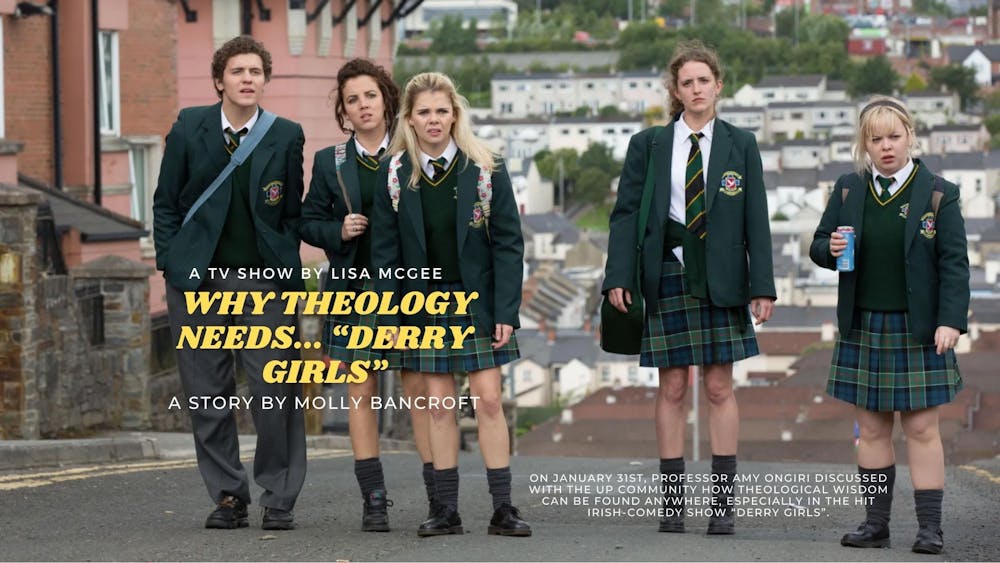Sitting in the Brian Doyle Auditorium, watching the music video to one of my favorite bands of all time, was not how I pictured my Wednesday night. “Zombie” by The Cranberries was playing over the speakers while the music video of children on the playground was shown before my eyes. When I first saw the flyer for “Why Theology Needs…Derry Girls” I was not expecting this sort of historical and cultural context.
But first, it’s important to know how I got there.
I knew that “Derry Girls” was a widely watched show, but I never expected a talk of this kind would be hosted on campus. While it is a great comedic show, it hadn’t occurred to me that theological wisdom could be obtained from it.
For context, I am a huge fan of the show. I have watched each episode at least three times, and plan to watch it again. The experiences of crying during each season’s finale, laughing at each joke like it was the first time I’d heard it and relating to so many collective Catholic school memories is what sparks my love for this series.
I knew I had to be at this event. Hosted by the Garaventa Center on Jan. 31, it was led by professor Amy Ongiri. They are the head of the ethnic studies department — not the first department that comes to mind when discussing theological subjects.
However, Ongiri provided a great overview not only of what “Derry Girls” can provide to viewers, but also discussed the important intersection of comedy and times of struggle.
Ongiri began to speak on “Derry Girls” directly after the showing of “Zombie.” They gave much praise to the showrunner Lisa McGee for being able to turn such a solemn time in Northern Ireland’s history into a laugh-out-loud comedy. According to quotes read by Ongiri, McGee based the show on many real-life scenarios she and her friends experienced during the same time period.
They explained that while some episodes may seem far-fetched in terms of their plot, it is truly realistic in the sense that during this time, many people had to use comedy to cope.
Nowhere is this more true than the first scene shown by Ongiri. While getting ready for her first day back at school, Erin (Saoirse-Monica Jackson) and her family hear news of a potential bomb threat on her usual bus route. This causes panic due to Erin’s mother’s (Tara Lynne O’Neill) annoyance at the potentiality of having to deal with her daughter staying at home for one more day. Ongiri explained how these seemingly dangerous circumstances are played as small inconveniences to the characters, similar to how it likely would’ve been in real life.
During tumultuous times, the narrative that is shown is only one of despair. However, as shown in this first scene, the citizens had to carry on with their lives.
In terms of theological wisdom, Ongiri devoted time to discussing how the show is unique in terms of how it depicts Catholicism through the teenage lens. The girls’ experiences on the show are quite similar to their experience in Catholic school — wanting to believe you saw an apparition to be deemed a miracle, having a crush on the “hot priest” of your school or having a no-nonsense nun as your principal.
The key takeaway that Ongiri drove home was that even in a time of conflict, where it may be difficult to realize, we are still all children of God. They point out how the show works to highlight how it can be difficult to recognize when God is present. But to the characters of “Derry Girls,” He’s present even in their times of craziness.
And it’s always okay to try and share a laugh with someone during these times. For most people, they need it during conflict more than anything.
Molly Bancroft is a reporter for The Beacon. She can be reached at bancroft26@up.edu.








